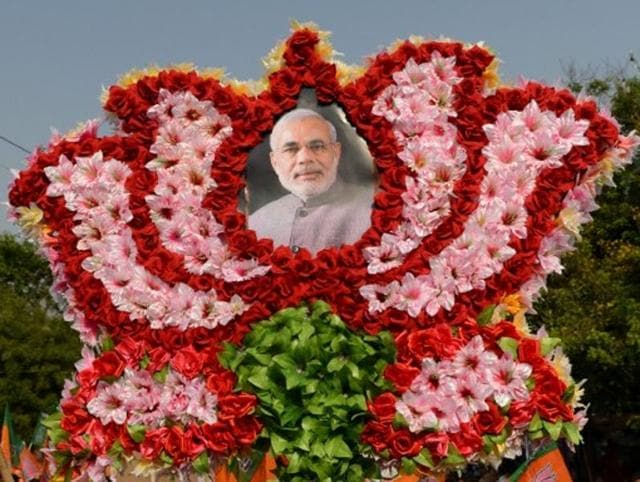When at sea, the BJP goes to the sea
There is something intrinsically binding between Modi and the Arabian Sea
Kozhikode beach in Kerala looked resplendent in saffron hues on Friday morning as the Bharatiya Janata Party’s flags fluttered along the coastline and deep into the Arabian Sea water - as if to stamp its suzerainty beyond land.

At his rally on this beach on Saturday evening, Prime Minister Narendra Modi is expected to do some hard talk in stating his government’s resolve to counter cross-border terrorism and separatist elements in Kashmir, which has been on the boil since the killing of militant commander Burhan Wani in July.
It will be Modi’s first public speech after the Sunday terror attack on the Uri army base that killed 18 Indian soldiers. Top functionaries of the government and the defence forces have held a series of deliberations to prepare India’s response to the attack.
Modi is expected to delineate the broad contours of this response in his speech that will also set the set the tone for the BJP’s resolution at the national council meet on Sunday. The contents of this resolution will come up for discussion at BJP chief Amit Shah’s meeting with the party’s central and state office-bearers on Friday afternoon.
Deliberations at the meeting of the BJP’s apex decision-making body will also shape the party’s strategy in the assembly elections in five states early next year. The resolution is expected to underscore the party’s commitment to Dalits and other oppressed sections of the society, who form a large chunk of the electorate in the poll-bound states.
But all eyes are on how the Prime Minister responds to the nationwide public outrage over the Uri terror attack in his rally. And the BJP’s rank and file might have reasons to expect something substantive from Modi’s speech on Kozhikode beach.
There is something intrinsically binding between Modi and the Arabian Sea. It was in the coastal state of Goa in June 2013 that the party declared him its campaign committee chief - overlooking the claims and aspirations of party veterans - which paved the way for his projection as the prime ministerial candidate.
It was in the same coastal state in April 2002 when Modi, who had been under pressure to resign as the chief minister after the communal riots in Gujarat, got a reprieve, thanks to the support of LK Advani despite Atal Bihari Vajpayee’s reservations. In 1995, it was in the coastal city of Mumbai that the BJP declared Vajpayee its PM candidate.
It is, therefore, something more than the wind to the fluttering BJP flags on Kozhikode beach. The sea brings rejuvenating breeze to the BJP and its top leaders. Or so it seems from past instances.
At a time when the party is on the back foot after the terror attack in Uri and a prolonged spell of unrest in Kashmir, the Kozhikode beach might bring something to cheer.





